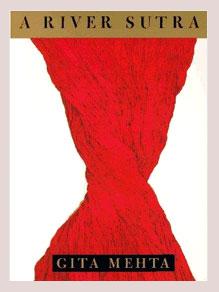At a Book Club Meeting held on Saturday, 26 th June 2010, at the
residence of Ms. Madhavi Murthy.
 Out and out, A River Sutra by Gita Mehta is about the Narmada river – a river in central India and the fifth largest river in the Indian subcontinent, forming the traditional boundary between North India and South India. After finishing the book, you feel fulfilled and yet unfulfilled, because now you want to be engaged to the stories that are connected with this mystical river. There are many fables about the river Narmada. The river has been mentioned by Ptolemy in the second century A.D. The Ramayan, Mahabharat, Puranas refer to the river, frequently. The Narmada happens to be one of the most sacred of the five holy rivers of India – the other four being Ganga, Yamuna, Godavari and Kaveri.
Out and out, A River Sutra by Gita Mehta is about the Narmada river – a river in central India and the fifth largest river in the Indian subcontinent, forming the traditional boundary between North India and South India. After finishing the book, you feel fulfilled and yet unfulfilled, because now you want to be engaged to the stories that are connected with this mystical river. There are many fables about the river Narmada. The river has been mentioned by Ptolemy in the second century A.D. The Ramayan, Mahabharat, Puranas refer to the river, frequently. The Narmada happens to be one of the most sacred of the five holy rivers of India – the other four being Ganga, Yamuna, Godavari and Kaveri.
From story to story, A River Sutra is packed with sufficient energy to hold the reader’s attention. A River Sutra may not have got anywhere close to the author’s earliest book, Raj, but it can be mentioned that Mehta continues to assimilate facts and narration well – enlarging the conclusions with elements of surprise and intrigue. The author picks up the pandemonium of a Jain procession with equal caliber as she can step forward to make the splendours of the forests and river come alive in front of us. The scenes that emerge of what is still remaining there for all of us makes one almost wild with joy to embrace the fragrances of the mango-blossoms and the wet earth.
Readers and authors work with each other with a dense understanding. The final breakthrough comes when the written thought freely expands its strength and the reader generously surrenders to it. Certain things instantly click between the reader and the author; this is where and how the purpose of a book is wholly served. A River Sutra to a very large extent succeeds in this. The old priest, Tariq Mia’s dialogues are wonderingly wise, e.g. Page 216 (He says to his chess companion) ‘Destiny is playing tricks on you, little brother. Don’t you realize you were brought here to gain the world, not forsake it?’ In a strange way those lines were like a face of solution as well as a frown of problems for me; the old mullah’s words continue to haunt me because his utterances are very profound. Tariq Mia carries on the conversation with our narrator and says to him: ‘For years you have been admiring the Narmada as if it is a woman. What has all your adoration taught you? Not even the capacity to sing. Prove me wrong, sing with me:
Forests heavy with wild jasmine
Embrace you with their fragrance'.
Tariq Mia’s lines legitimately draw justice in showing how the majority of us are alive without enjoying the pristine purity of life which has never been denied to us.
Coming to the portions of poetry into English from the Indian language: the frequent verses easily stir us to grasp the richness of the original. The book adequately sheds light on the ethnic and cultural multiplicity of India’s past and present heritage – not missing out on the obvious curses of disparity.
As a reader, one can also relentlessly go back to the great epics. You are drawn to Vyasa, Kalidas, Shankaracharya, Rupmati and Baaz Bahadur, and you certainly do not want to be missing out on Kipling. You see, that is what I meant about A River Sutra – you feel fulfilled and yet, unfulfilled. Now you want to be engaged to the stories that are connected with its primary subject: the river, Narmada.